 Petzlover
Petzlover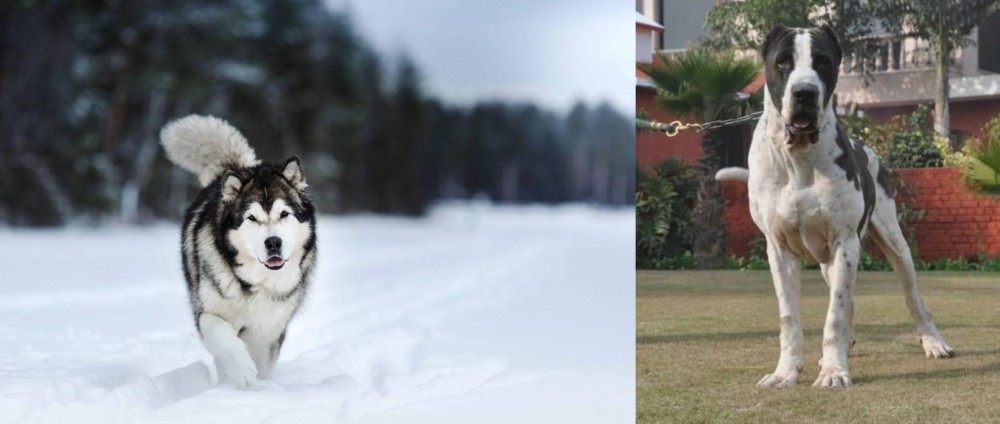 Siberian Husky is originated from Russia but Bully Kutta is originated from India. Siberian Husky may grow 29 cm / 11 inches shorter than Bully Kutta. Siberian Husky may weigh 63 kg / 138 pounds lesser than Bully Kutta. Both Siberian Husky and Bully Kutta has almost same life span. Both Siberian Husky and Bully Kutta has almost same litter size. Siberian Husky requires Moderate Maintenance. But Bully Kutta requires Low Maintenance
Siberian Husky is originated from Russia but Bully Kutta is originated from India. Siberian Husky may grow 29 cm / 11 inches shorter than Bully Kutta. Siberian Husky may weigh 63 kg / 138 pounds lesser than Bully Kutta. Both Siberian Husky and Bully Kutta has almost same life span. Both Siberian Husky and Bully Kutta has almost same litter size. Siberian Husky requires Moderate Maintenance. But Bully Kutta requires Low Maintenance
 Siberian Huskies are very close to Chukchi people.Chukchi is a tribe in Siberian nomads and huskies are beleived to be originated with them. DNA tests on huskies prove that they are the oldest among the dog breeds and they used them to travel fast. Also children used to sleep with them as they provide body heat to them. Siberian Huskies also like to be very close to the children. In 1908 at the gold rush, huskies were imported to Alaska and used as sled dogs. In Alaska they were used for dog sled race until today.
Siberian Huskies are very close to Chukchi people.Chukchi is a tribe in Siberian nomads and huskies are beleived to be originated with them. DNA tests on huskies prove that they are the oldest among the dog breeds and they used them to travel fast. Also children used to sleep with them as they provide body heat to them. Siberian Huskies also like to be very close to the children. In 1908 at the gold rush, huskies were imported to Alaska and used as sled dogs. In Alaska they were used for dog sled race until today.
Siberian Huskies were exported from Siberia and they continued their journey in North America. American kennel club recognized them in 1930 and the Siberian club of america has been founded in 1938.
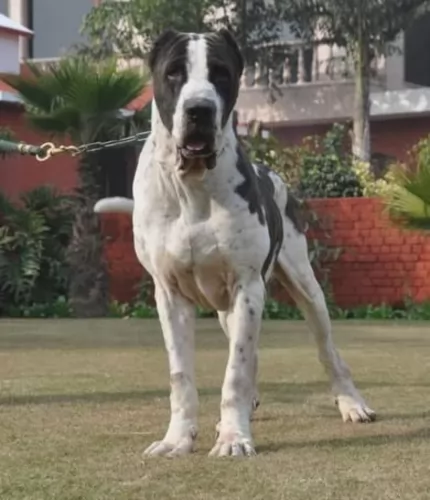 This well built, powerful dog breed is also known as Indian Alangu Mastiff or Pakistani Mastiff. These dogs come from the Punjab and Sindh region of the Indian subcontinent. It is believed that mastiff dogs came with British soldiers during the British invasion, however English Mastiffs, Bulldogs, Bull Terriers and Great Danes are seen as potential ancestors of this large dog.
This well built, powerful dog breed is also known as Indian Alangu Mastiff or Pakistani Mastiff. These dogs come from the Punjab and Sindh region of the Indian subcontinent. It is believed that mastiff dogs came with British soldiers during the British invasion, however English Mastiffs, Bulldogs, Bull Terriers and Great Danes are seen as potential ancestors of this large dog.
There are disputes about the country of origin of this breed, and some people claim that the dog comes from India, while others say it comes from Pakistan. Certainly in Pakistan these dogs are still used for fighting.
 Siberian Huskies are said to be one of the beautiful dog breeds in the world. They are well known for their thick coat and blue coloured eyes. Siberian Huskies are really challenging for new dog owners. It is preferred to give them a fenced yard and the fence should be sunk well to the ground to prevent them from escaping, as they always try to escape. They are medium sized working dogs having high energy level. Initially huskies were developed as sled dogs.
Siberian Huskies are said to be one of the beautiful dog breeds in the world. They are well known for their thick coat and blue coloured eyes. Siberian Huskies are really challenging for new dog owners. It is preferred to give them a fenced yard and the fence should be sunk well to the ground to prevent them from escaping, as they always try to escape. They are medium sized working dogs having high energy level. Initially huskies were developed as sled dogs.
They are affectionate and intelligent breed. Also they are independent in nature. They are kid friendly dogs and also are friendly with everyone including strangers. Siberian Huskies will be a good companion when given proper training and care. They are low shedders but it depends on the climate it lives. Normally they dont shed in cold climate but in warmer climate they will do. They shed heavily twice in a year for a three week strech. Normally Siberian Huskies do not suit well for apartment living. They are not watchdogs as they will bark very rarely but it enjoys to howl.
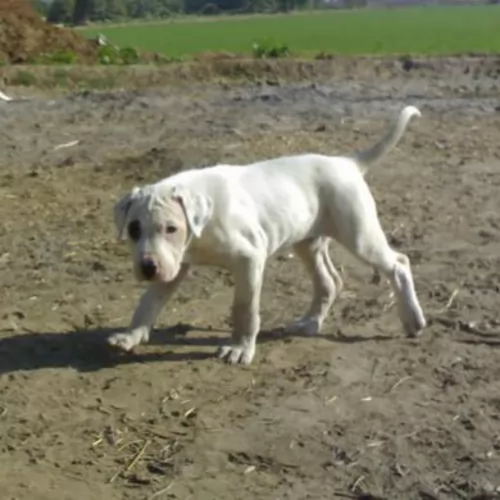 The Bully Kutta is a big, heavy, muscular dog, standing at roughly 81 – 89cm and weighing in at 70–90kg. He isn’t particularly good with children or with other pets simply because the dog is aggressive by nature. If you do opt for this large breed, you’re going to need a large garden and he is going to require a lot of exercise.
The Bully Kutta is a big, heavy, muscular dog, standing at roughly 81 – 89cm and weighing in at 70–90kg. He isn’t particularly good with children or with other pets simply because the dog is aggressive by nature. If you do opt for this large breed, you’re going to need a large garden and he is going to require a lot of exercise.
This is a dog breed that is going to require socialization and training if you want him to be obedient and calm, as he is inclined to be a dominating breed. He’s an intelligent dog and when well trained, he makes a splendid pet with firm, fair owners.
The Bully Kutta has a large, broad head which is supported by a thick well-muscled neck. The skin around his lower jaw is loose. The ears are short, set high and are mostly cropped, but other times they are left to flop over. The tail is sometimes docked but these days mostly left long and tapered.
He has a short smooth coat and is essentially white in color although the coat can also be fawn, brown, black or brindle.
 Siberian Huskies are very much affectionate with children. But it is necessary to train both parties to behave with each other. It is recommended to have an adult supervision for younger children.
Siberian Huskies are very much affectionate with children. But it is necessary to train both parties to behave with each other. It is recommended to have an adult supervision for younger children.
They are very good diggers and so they should be watched if they are in garden. They tolerate well in cold weather and mostly huskies can be seen in the area of snow falling. They are very good in pulling sledges.
They adapt well in cold weather. It is advised to give them a well fenced yard. They do not like apartment living. Also they do not like to be alone and if kept alone for long time they will disturb your house and make it dirty.
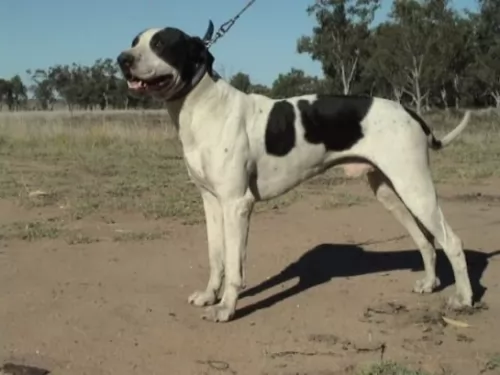 The Bully Kutta is a powerful, imposing dog and they have been nicknamed the ‘Beast from the East’. Unfortunately it is this dog’s thick bones, his looks and his strength that have him used for cruel dog fighting in Pakistan.
The Bully Kutta is a powerful, imposing dog and they have been nicknamed the ‘Beast from the East’. Unfortunately it is this dog’s thick bones, his looks and his strength that have him used for cruel dog fighting in Pakistan.
When not used for fighting, he makes a loyal, devoted companion for the owner who ensures proper socialization and training. Well raised Bully Kuttas are then good with children, being loving, protective and playful.
One just hopes that the future of this giant dog breed is brighter, and that he will be looked upon as more of a companion that just a dog-fighting object to bring in money for his owner.
 Siberian husky suffers with minor health problems such as hypothyroidism, Progressive retinal atrophy and cataract. They are also prone to lose pigment in nose and muzzle. Some health problems occur due to bad breeding practices and some due to environmental problems where the puppy is brought up. They have also chances to get skin disease such as allergies.
Siberian husky suffers with minor health problems such as hypothyroidism, Progressive retinal atrophy and cataract. They are also prone to lose pigment in nose and muzzle. Some health problems occur due to bad breeding practices and some due to environmental problems where the puppy is brought up. They have also chances to get skin disease such as allergies.
When they are in the age of 2 to 5 years, they are having chances to hairloss due to Alopecia X. This condition mainly causes due to hair clipping in Siberians. They will be healthy but the hair will not grow in affected areas. Siberians are double coated and when the situation prevails the topcoat will fall off first and the undercoat follows it. The hair will fall off in both side of the dog in same area. Spaying or neutering will reduce such problems as it causes because of sex hormones.
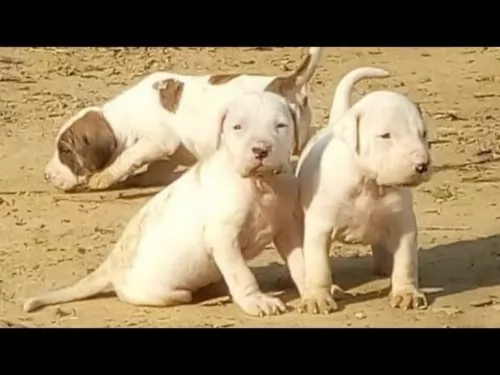 Your Bully Kutta is generally a healthy dog and not often affected by hereditary diseases, but with giant breeds such as this you will have to look out for diseases common to large dogs.
Your Bully Kutta is generally a healthy dog and not often affected by hereditary diseases, but with giant breeds such as this you will have to look out for diseases common to large dogs.
Typical illnesses to watch out for will include hip dysplasia, arthritis, skin allergies and bloat.
This is an inherited condition where the hip joint is improperly formed. For your Bully Kutta it causes wear and tear as well as stiffness in the hips and your dog battles to rise after lying down.
Arthritis in your dog can be managed but it can cause a lot of discomfort for him. This inflammation of the joints can cause pain and stiffness. It is more often seen in older dogs. It can also start at an early age because of problems with bone and joint development and abnormal rubbing within the joint.
Today there are a number of therapy options that can bring some kind of relief to your dog.
 In one method of feeding the Husky puppies, the food will be given always available, but this method is not recommended as it has some problems. This method is followed by large breeders because of lack of time to spend on individuals. Another method is to keep meal for 3 times a day. At about 12 to 16 weeks of age the meals can be reduced to two times a day. In this method the meal given should not be there after 15 minutes even if puppy did not ate. The important training for Husky puppies while eating is they should not growl when the food is taken by its master.
In one method of feeding the Husky puppies, the food will be given always available, but this method is not recommended as it has some problems. This method is followed by large breeders because of lack of time to spend on individuals. Another method is to keep meal for 3 times a day. At about 12 to 16 weeks of age the meals can be reduced to two times a day. In this method the meal given should not be there after 15 minutes even if puppy did not ate. The important training for Husky puppies while eating is they should not growl when the food is taken by its master.
Many Siberian experts don't like commercial dog food as they are sure that because of such foods dog may get problems like itching, dandruff, loose stools and hot spots. According to experts the good food for them are home cooked food from turkey, real chicken, beef and fish. Fruits and fresh vegetables are also very good for them. It is advised by dog owners to add only low salt or even without salt in their food. Also sugar is not good for them as it will bring some problems like hairfall and itching.
Siberian huskies can be easily groomed. Their eyes should be checked in puppyhood as they get chances to get eye problems and hereditary eye diseases. It is advised to make siberians to bath once in a year and they must be brushed once in a week. While brushing, the ears should be inspected and its teeth should be brushed. It is good to trim the long hairs in their feet and also nails should be trimmed slightly and very carefully as they have blood vessels there.
To give training and exercises to Siberian Huskies, the home should be prepared for them and it is better to make a fenced yard to prevent escapes. They have very high chances to escape and so the fence should be minimum 6 feet high and base should be strong as it should not break it or dig under to escape. Since they are active from their puppyhood they must be given lots of exercise. They should be socialized in their early stages as to get good behaviour and manners.
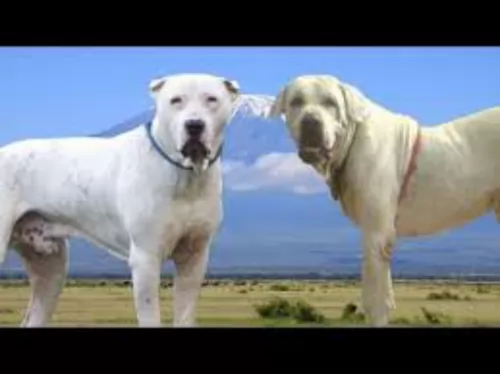 The short coat is low maintenance and as a moderate shedder too, all that is required really is to give your Bully Kutta a good brush twice a week to keep the coat in good condition.
The short coat is low maintenance and as a moderate shedder too, all that is required really is to give your Bully Kutta a good brush twice a week to keep the coat in good condition.
Brush his teeth 2 or 3 times a week with special canine-toothpaste and toothbrush to prevent plaque build-up. He’s a drooler too, so you will need to wipe his face and maybe your clothes of slobber from time to time.
This strong, muscular dog of yours will require an excellent diet. It’s always wonderful if you can give him home-made food such as vegetables, rice and meat. These days you get excellent commercially manufactured food for dogs, and your vet can advise you on the best food for a large, active dog such as the Buly Kutta.
Raw meat is absolutely essential for your dog from time to time and will ensure that his coat doesn’t become dull and with bald spots. Remember, that before dogs were domesticated they used to live on raw meat, so see that he gets some raw meat to prevent skin disorders. Make sure your large pet has a constant supply of fresh, cool water.
Bully Kuttas are going to need a walk every day in the form of exercise. If he is socialized you can take him into the park for ball games. He is a dog that will require plenty of space.